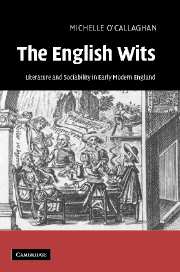Book contents
- Frontmatter
- Frontispiece
- Contents
- Acknowledgements
- Note on the text
- Introduction
- Chapter 1 Gentleman lawyers at the Inns of Court
- Chapter 2 Ben Jonson, the lawyers and the wits
- Chapter 3 Taverns and table talk
- Chapter 4 Wits in the House of Commons
- Chapter 5 Coryats Crudities (1611) and the sociability of print
- Chapter 6 Traveller for the English wits
- Chapter 7 Afterlives of the wits
- Notes
- Bibliography
- Index
Introduction
Published online by Cambridge University Press: 22 September 2009
- Frontmatter
- Frontispiece
- Contents
- Acknowledgements
- Note on the text
- Introduction
- Chapter 1 Gentleman lawyers at the Inns of Court
- Chapter 2 Ben Jonson, the lawyers and the wits
- Chapter 3 Taverns and table talk
- Chapter 4 Wits in the House of Commons
- Chapter 5 Coryats Crudities (1611) and the sociability of print
- Chapter 6 Traveller for the English wits
- Chapter 7 Afterlives of the wits
- Notes
- Bibliography
- Index
Summary
To the High Seneschall of the right Worshipfull Fraternitie of Sireniacal Gentlemen, that meet the first Fridaie of every Moneth, at the signe of the Mere-Maide in Bread-streete in London.
Thomas Coryate's letter from Ajmer, India, addressed to the Sireniacal gentleman is one of the remaining textual traces of the convivial societies that met at the Mermaid and Mitre taverns, both on Bread Street, in the first decades of the seventeenth century. Many of the Sireniacs also appeared among the diners named in a Latin poem often given the title ‘Convivium Philosophicum’, commemorating a banquet held at the Mitre in September 1611, and were among the wits who gathered in print to mark the publication of Coryats Crudities (1611). One can trace a web of references to wits frequenting the Mitre and Mermaid on Friday nights in this period through letters, account books, poems, plays and pamphlets. These early modern societies were distinguished from more informal gatherings through their rituals of association, which provided participants with a quasi-ceremonial space for recreation, play and table talk. The term ‘wits’ took on a more specific meaning in the late sixteenth and early seventeenth centuries that coincided with these tavern societies; its general sense as a collective noun was made particular, and attached to a distinct milieu within early modern London that cultivated a fashionable, urbane reputation.
- Type
- Chapter
- Information
- The English WitsLiterature and Sociability in Early Modern England, pp. 1 - 9Publisher: Cambridge University PressPrint publication year: 2007

